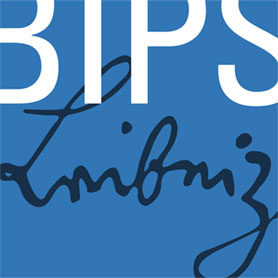Partners
The Leibniz ScienceCampus model enables Leibniz institutions and universities to establish a thematically focused partnership that will further develop the respective research area and strengthen the scientific environment for this topic. The Leibniz Institute for Prevention Research and Epidemiology - BIPS, the Fraunhofer Institute for Digital Medicine MEVIS and the University of Bremen are cooperating in the new research network.
1. Leibniz-Institute for Prevention Research and Epidemiology - BIPS
2. Fraunhofer MEVIS
3. University of Bremen

Leibniz-Institut BIPS
Health research for the well-being of the people

Fraunhofer MEVIS
Institute for Digital Medicine

University of Bremen
University of ExcellenceBIPS—Health research for the well-being of the people
The Leibniz Institute for Prevention Research and Epidemiology - BIPS develops effective strategies for the prevention of chronic, non-communicable diseases. Supporting a healthy life-course early on is our primary goal. The focus of our research is therefore on factors beyond individual diseases, such as lifestyle and environment, biological and social factors, as well as early detection and drug safety. Our research spectrum covers methodological development, the identification of the causes of diseases, and intervention and implementation research. BIPS thus covers the entire cycle of epidemiological research. The institute also offers information to politicians and the general public and is also involved in the teaching and furthering of academic qualifications of young scientists. BIPS has been WHO Collaborating Centre for Obesity Prevention, Nutrition and Physical Activity since September 2016.
BIPS is a member of the Leibniz Association, which comprises 96 independent research institutions. The focus of Leibniz institutes extends from the natural, engineering and environmental sciences, to the economic, spatial and social sciences and the humanities. Leibniz institutes address socially, economically and ecologically relevant issues. Due to their national importance, the institutes of the Leibniz Association are jointly funded by the Federal Government and the Federal States. The Leibniz institutes employ around 20,000 people, including 10,000 scientists. The total budget of the institutes amounts to more than 1.9 billion Euros.Fraunhofer Institute for Digital Medicine MEVIS
Embedded in a worldwide network of clinical and academic partners, Fraunhofer MEVIS develops real-world software solutions for image and data supported early detection, diagnosis, and therapy. Strong focus is placed on cancer as well as diseases of the circulatory system, brain, breast, liver, and lung. The goal is to detect diseases earlier and more reliably, tailor treatments to each individual, and make therapeutic success more measurable.
In addition, the institute develops software systems for industrial partners to undertake image-based studies to determine the effectiveness of medicine and contrast agents. To reach its goals, Fraunhofer MEVIS works closely with medical technology and pharmaceutical companies, providing solutions for the entire chain of development from applied research to certified medical products.
MEVIS is a member of the Fraunhofer Society, the leading organization for applied research in Europe. 72 institutes and research institutions work under their roof at locations all over Germany. More than 26,600 employees achieve the annual research volume of more than 2.6 billion euros. Of this, more than 2.2 billion euros are in the area of contract research. The Fraunhofer Society generates around 70 percent of this service area with orders from industry and with publicly funded research projects. International collaborations with excellent research partners and innovative companies worldwide ensure direct access to the most important current and future scientific and economic areas.The University of Bremen in Profile
The University of Bremen is a medium-sized German university with around 20,000 students. Bremen offers a wide range of subjects for its committed and talented students: More than 100 masters programs and bachelor programs, as well as the state law exam. Moreover, with research-based learning, the university has reinterpreted project studies, a defining feature originating from when it was founded. As part of the European university network YUFE - Young Universities for the Future of Europe – it is developing a new model for European higher education together with seven other universities.
2,300 academics (43%), among them 270 professors (32% women), teach and carry out research in a wide range of disciplines. The university has a long established tradition in interdisciplinary cooperation and excellent research in natural sciences, engineering, the social sciences and the humanities, as well as in teacher training. From 2012-2019, the university of Bremen, with its Institutional Strategy “Ambitious and Agile”, was one of eleven universities that held the title of “University of Excellence.”
The participants at the University of Bremen are:
Department 3
Cognitive Systems Lab (Prof. Dr. Tanja Schultz)
Research Group Cognitive Neuroinformatics (Prof. Dr. Kerstin Schill)
Research Group Human-Computer Interaction
Digital Media Lab (Prof. Dr. Rainer Malaka)
Competence Center for Clinical Studies Bremen (Prof. Dr. Werner Brannath)
Center for Media, Communication and Information Research (Prof. Dr. Andreas Breiter)
Department 6
Institute for Information, Health and Medical Law (Prof. Dr. Benedikt Buchner)
Department 9
Institute for Ethnology and Cultural Studies (Dr. Katrin Amelang, Prof. Dr. Dorle Dracklé, Dr. Oliver Hinkelbein, Prof. Dr. Michi Knecht)
Institute for Philosophy (Prof. Dr. Dagmar Hella Borchers)
Center for Media, Communication and Information Research (Prof. Dr. Andreas Hepp)
Department 11
Institute for Public Health and Nursing Research (Dr. Karin Bammann, Prof. Dr. Gabriele Bolte, Prof. Dr. Ingrid Darmann-Finck, Prof. Dr. Ansgar Gerhardus, Prof. Dr. Wolf Rogowski, Prof. Dr. Benjamin Schüz, Prof. Dr. Karin Wolf-Ostermann)
SOCIUM Research Center Inequality and Social Policy (Prof. Dr. Heinz Rothgang)
 English (United Kingdom)
English (United Kingdom)  Deutsch (Deutschland)
Deutsch (Deutschland) 



